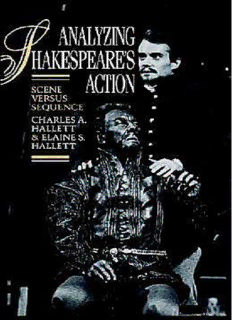
Analyzing Shakespeare's Action: Scene versus Sequence PDF
Preview Analyzing Shakespeare's Action: Scene versus Sequence
In this book the Halletts have examined dramatic form in Shakespeare's plays and have found the overall pattern of pacing and action to be independent of the scene. They have identified within scenes and acts hidden units of articulation defined here as the beat, the sequence, and the frame, each unit type having a distinct but different purpose within the larger whole. For both scholar and practitioner, their observations offer new insights about how the building blocks of the plays are deployed. Detailed analysis of the unfolding action reveals that Shakespeare's scenes frequently consist of a series of sequences, each with its own individual climax, and these sequences are regularly built up of a succession of smaller units, or beats. Several sequences usually work together to create a still larger action, or frame. Study of these components yields valuable information about Shakespeare's playwriting techniques (information not readily available elsewhere in critical literature) and is of immense value in articulating the dramatic rhythms and structure of Shakespeare's action. This analytical method, while especially tuned to Shakespeare, can also be adapted to other dramatists in varying degrees. The book will be of interest to students and scholars of Shakespeare and theater studies as well as to actors and directors. Analyzing Shakespeare's Action Analyzing Shakespeare's Action Scene versus Sequence CHARLES A. HALLETT and ELAINE S. HALLETT The right of the University of Cambridge to print and sell all manner of books was granted by Henry VIII in 1534. The University has printed and published continuously since 1584. CAMBRIDGE UNIVERSITY PRESS Cambridge New York Port Chester Melbourne Sydney Published by the Press Syndicate of the University of Cambridge The Pitt Building, Trumpington Street, Cambridge CB2 IRP 40 West 20th Street, New York, NY IOOII, USA 10 Stamford Road, Oakleigh, Melbourne 3166, Australia © Cambridge University Press 1991 First published 1991 Printed in Great Britain at the University Press, Cambridge British Library cataloguing in publication data Hallett, Charles A. Analyzing Shakespeare's Action: Scene versus Sequence 1. Drama in English. Shakespeare, William, 1564-1616 1. Title 11. Hallett, Elaine S. 1935- 822.33 Library of Congress cataloguing in publication data Hallett, Charles A. Analyzing Shakespeare's Action/ Charles A. Hallett and Elaine S. Hallett. p. cm. Includes bibliographical references. ISBN o 521 39203 9 1. Shakespeare, William, 1564-1616- Technique. 2. Drama - Technique. 1. Hallett, Elaine S., 1935- . 11. Title. PR2995.H26 1991 822.3'3-dc2O 90-40404 CIP ISBN 0521 39203 9 hardback SE To Cecy and to all of the Jacome family in whom the virtues Shakespeare admired are resplendent It becomes an author generally to divide a book, as it does a butcher to joint his meat, for such assistance is of great help to both the reader and the carver. Henry Fielding Contents Acknowledgments page x 1 Scene versus sequence in Shakespeare's plays i 2 The beat defined 11 3 Ancillary beats: the interval beat, the interpolated beat, the linking beat 32 4 Sequential beats: the introductory beat 49 5 Sequential beats: the concluding beat 68 6 Sequential beats: the intensifying beat 80 7 The dramatic question 109 8 Observing and meditating sequences 123 9 Reporting and interrogating sequences 135 10 Persuading sequences 152 11 Disputing sequences 167 12 Commanding sequences 183 13 Sequences combined: the frame 187 Notes 209 Glossary 220 Index of sequences analyzed 225 General index 227 IX
Description: